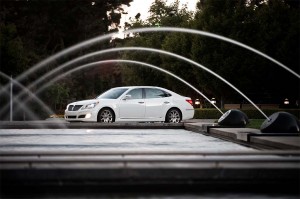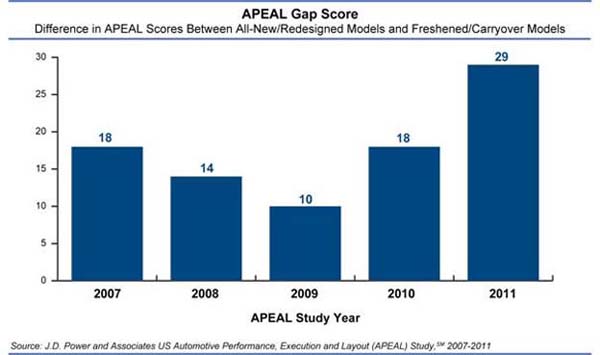Porsche is far and above the most “APEAL”-ing brand when it comes to American auto buyers, but the all-new Hyundai Equus, the Korean maker’s first premium luxury sedan, was far and away the highest-rated individual model in the latest annual APEAL study by J.D. Power and Associates.
Short for Automotive Performance, Execution and Layout, the APEAL Study takes a very different look at the automotive market compared to traditional defect-based surveys, such as Power’s Initial Quality Study, or IQS. It looks at what might be called “things-gone-right,” the surprise-and-delight features that might make one model a standout even when compared to a product with a lower overall things-gone-wrong quality rating.
By that measure, the 2011 models are more appealing, in fact reaching a historic high for the study, which was first conducted in 1996. On a 1,000-point scale, the average 2011 model scored 781, up from 778 last year. Significantly, the industry seems to be figuring out what it takes to make their products more enticing, as demonstrated by the class of 2011. All-new 2011 models, on average, scored 29 points higher than holdover products – the biggest gap since the APEAL survey was launched.
“The auto industry has taken a battering during the past few years,” said David Sargent, Power’s vice president of global vehicle research. “However… automakers have never lost sight of the fact that survival—and ultimately success—only comes from winning over customers in the showroom. Offering highly appealing vehicles is one of the primary means to succeed.”
Though there is often a correlation between how brands fare in both studies – Porsche typically doing well in both and this year being named the most APEAL-ing maker for the seventh year in a row.
Dodge is an example of a maker that does well in APEAL but lags in IQS. The domestic marque captured three different segment wins with its Challenger, Charger and new Durango models. Only BMW matched that performance, winning three segments with its X3, Z4 and 5-Series.
Hyundai showed the most improvement between the 2010 and 2011 APEAL studies. But, significantly, it topped the charts with its new Equus, its first attempt to challenge the likes of top-line luxury cars such as the BMW 7-Series and Mercedes-Benz S-Class.
In fact, this marks the first year that a model other than the 7 Series, S-Class or Lexus LS has led the overall model ranking.
A wide array of manufacturers captured at least one segment win, Ford and Honda each garnering two – for the F-150 and Fiesta and for the Ridgeline and odyssey, respectively. Several things-gone-wrong laggards appeared on the list, Volkswagen winning with the GTI and Land Rover with the Range Rover.
Notably absent was Toyota, which took no segment awards, though it did score with its other brands with the Lexus iS and Scion xB.
There’s an on-going debate in the industry about what really matters most: things-gone-wrong or things-gone-right. The latest IQS score shows that, over the past decade, there have been massive improvements in quality, with even the worst brands experiencing little more than one initial defect during the first 90 days of ownership.
Think of them as “two sides of the quality coin,” said Sargent. “Both are of critical importance, and models that perform well on both measures generate higher levels of recommendation and, ultimately, higher loyalty to the brand. In general, customers are also willing to pay more for vehicles that combine high appeal with high initial quality.”
Power’s approach has been to use two separate studies. Other research firms have tried combining them both in one score. Which is more accurate remains to be seen but it is clear that consumers care about more than just rattles and squeaks and also want to be surprised and delighted.


